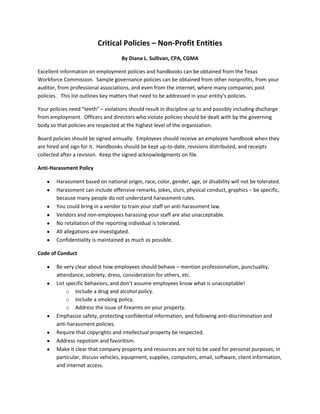Tips and Tools for Great Financial Management: Critical Policies (support material)
- 1. Critical Policies ŌĆō Non-Profit Entities By Diana L. Sullivan, CPA, CGMA Excellent information on employment policies and handbooks can be obtained from the Texas Workforce Commission. Sample governance policies can be obtained from other nonprofits, from your auditor, from professional associations, and even from the internet, where many companies post policies. This list outlines key matters that need to be addressed in your entityŌĆÖs policies. Your policies need ŌĆ£teethŌĆØ ŌĆō violations should result in discipline up to and possibly including discharge from employment. Officers and directors who violate policies should be dealt with by the governing body so that policies are respected at the highest level of the organization. Board policies should be signed annually. Employees should receive an employee handbook when they are hired and sign for it. Handbooks should be kept up-to-date, revisions distributed, and receipts collected after a revision. Keep the signed acknowledgments on file. Anti-Harassment Policy Harassment based on national origin, race, color, gender, age, or disability will not be tolerated. Harassment can include offensive remarks, jokes, slurs, physical conduct, graphics ŌĆō be specific, because many people do not understand harassment rules. You could bring in a vendor to train your staff on anti-harassment law. Vendors and non-employees harassing your staff are also unacceptable. No retaliation of the reporting individual is tolerated. All allegations are investigated. Confidentiality is maintained as much as possible. Code of Conduct Be very clear about how employees should behave ŌĆō mention professionalism, punctuality, attendance, sobriety, dress, consideration for others, etc. List specific behaviors, and donŌĆÖt assume employees know what is unacceptable! o Include a drug and alcohol policy. o Include a smoking policy. o Address the issue of firearms on your property. Emphasize safety, protecting confidential information, and following anti-discrimination and anti-harassment policies. Require that copyrights and intellectual property be respected. Address nepotism and favoritism. Make it clear that company property and resources are not to be used for personal purposes; in particular, discuss vehicles, equipment, supplies, computers, email, software, client information, and internet access.
- 2. Critical Policies ŌĆō Non-Profit Entities Diana L. Sullivan, CPA, CGMA Page 2 of 2 Confidentiality Point out specific types of sensitive information to protect. Protect the personal information of employees, vendors, and consumers of your service. Address transmission and storage of sensitive electronic information. Conflict of Interest Policy Have policies for both the board and employees. Prohibit second jobs and businesses if they conflict with the entity. Prohibit receiving gifts, favors, entertainment and payments for personal gain. Prohibit sending entity business to yourself or family members. Require disclosure of possible conflicts. Require abstention for board votes with possible conflicts. Equal Employment Opportunity Policy requires non-discrimination in employment and in choosing vendors. Hiring, firing, training, promotion, transfer, layoffs, recall, compensation and benefits, contracting, must all be non-discriminatory. Harassment based on national origin, race, color, gender, age, disability is not tolerated. Document Retention & Destruction Policy List the kinds of records you keep, how long to retain records, and when to destroy items. List which records can be discarded and which ones must be shredded. List which records must be retained permanently. Use a safety deposit box for critical items and keep photocopies in the office. Whistleblower Policy - Open Door Policy Specify someone employees can go to with problems and issues, especially when they feel they cannot work out problems with their own manager. Encourage employees to report problems to protect the entity. Specifically encourage them to help prevent theft and fraud. Devastating situations are often detected and stopped because of whistleblowers. You could use a board member, a whistleblower hotline, or an outside service. Managers are advised of their obligation to have an ŌĆ£open door.ŌĆØ Remember ŌĆō these policies can prevent or detect a lot of serious problems!


